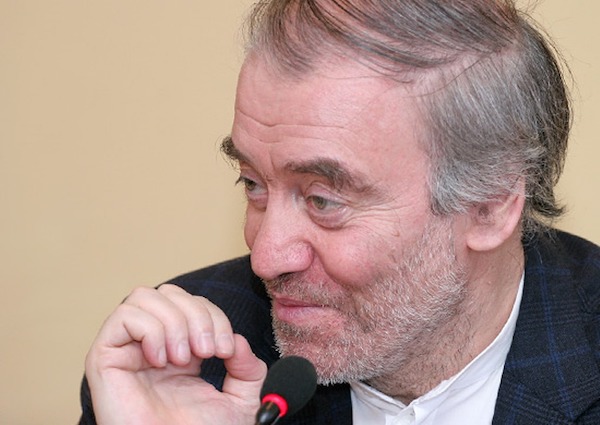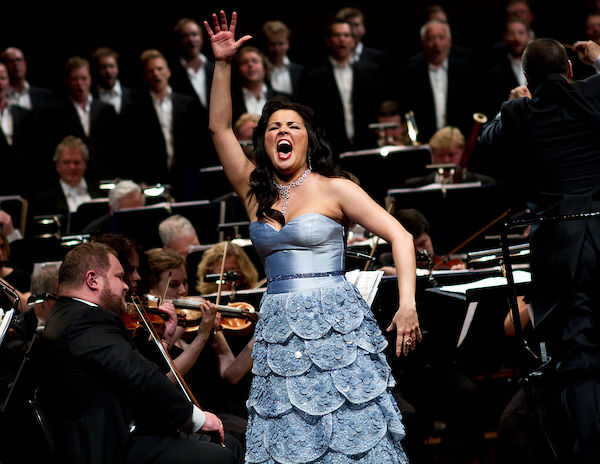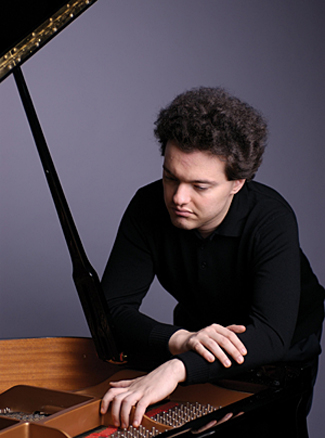Cultural Commentary: The Gergiev Case
By Jonathan Blumhofer
There are times – and we’ve been living in these for several years now – when boldness is required, especially from artists.

Russian conductor Valery Gergiev — for all the mealy-mouthed protestations to the contrary, he has clearly allied himself with Putin and happily does his government’s bidding. Photo: Wiki Common
The conundrum of art’s relationship with politics and morality is an old but persistent one. Indeed, the notion’s been front-and-center lately as performing arts institutions and presenters worldwide have moved to distance themselves from Russian musicians (and, sometimes, music) following Vladimir Putin’s invasion of Ukraine.
In the classical music world, the most prominent figure to get his comeuppance has been the conductor Valery Gergiev. Given the lethargy that often permeates the art form, Gergiev’s fall has been impressively swift: in just one week, he was removed from the leadership of the Munich Philharmonic, excommunicated from the Rotterdam Philharmonic (with which he has a relationship going back nearly 35 years), dropped by his Western agent, and otherwise seen his lucrative European and American careers vanish into the ether.
The conductor’s crime, such as it is, is his refusal to distance himself from the Russian president’s latest military exploits. That he’s reluctant to do so isn’t surprising: Gergiev’s been friends with Putin since the early ’90s. To be sure, the conductor’s willing engagement in Russian propaganda efforts — compounded by his public support for Russia’s past aggressive regional policies and discriminatory domestic legislation — has earned him protests in the West for decades. Over the years, though, picketers outside Carnegie Hall have been outnumbered by ticket holders and ignored by administrators; now they’re garnering belated vindication.
Gergiev isn’t the only classical musician earning his just deserts. Pianist Denis Matsuev, another outspoken Putin supporter, has been similarly isolated, as has the Metropolitan Opera’s reigning diva, soprano Anna Netrebko. One can only imagine how well pianist Valentina Lisitsa’s ill-timed recording comeback this year will unfold: the Kyiv-born artist’s career was, in case you forgot, derailed in 2015 by a long series of pro-Ukrainian separatist tweets and performances.
Satisfying, on some level, as this form of belated accountability is, it raises numerous larger, more difficult questions, none of which offer easy answers.
Perhaps the most pressing concern involves how and when politics and music intertwine as well as whether it is necessary for artists to share their, fundamentally, privately held views with the public. History’s full of all sorts of problematic examples of both; maybe the most prominent recent one is that of Wilhelm Furtwängler.
Widely regarded as one of the 20th-century’s greatest conductors, Furtwängler, then music director of the Berlin Philharmonic, elected to remain in Germany during the Third Reich. Arguing that music is above politics and that his fidelity to German art did not make him a Nazi (true, he never joined the Party; his successor in Berlin, Herbert von Karajan did — twice), Furtwängler was still one of the cultural Crown Jewels of Josef Goebbels’s Propaganda Ministry.
Like Furtwängler, Gergiev is fond of arguing that his art is apolitical and that the man can be neatly separated from his work. This shared creed, however, is about as much as the two maestros have in common. Musically, there’s little comparison between the two. Morally, too, the German comes out ahead: for all the misguidedness of his beliefs and the real taint of his association with Hitlerism, Furtwängler at least worked to protect his musicians — especially Jewish ones — from the clutches of the State.
Gergiev, on the other hand, has appeared in campaign commercials for Putin and glibly provided the sheen of cultural approval to any number of the Russian president’s undertakings in the last 20 years, including leading concerts after military operations in South Ossetia in 2008 and in Palmyra, Syria, in 2016.
In his case, then, things seem clear-cut. For all the mealy-mouthed protestations to the contrary, Gergiev has clearly allied himself with Putin and happily does his government’s bidding. Rather than divorce himself from politics, he’s done about all he can to fuse his work as an artist with his political views.

Metropolitan Opera’s reigning diva, soprano Anna Netrebko. Photo: Wiki Common
Netrebko’s situation is slightly muddier. Though Russian-born, she’s now an Austrian citizen and lives in Vienna. She has, in the past, backed pro-Russian Ukrainian separatists, but Netrebko was quick to voice opposition to the current assault on the country’s sovereignty via Instagram. However, she followed up her initial statement with subsequent, qualifying ones and wrapped them all up by rounding on her critics — after which the whole chain of posts was deleted. Netrebko then announced that she was taking a hiatus from performing.
However, before denouncing her foes as “human shits,” Netrebko did make, albeit obliquely, a valid point. In one of her final posts, she stated that “forcing artists … to voice their political opinions in public and to denounce their homeland is not right.” Granted, no one’s been asked to vilify Mother Russia — instead, the request has been to clarify positions on Putin and his war — but I think her first objection here is correct.
Especially in times of conflict, political purity tests, well-meaning though they may be, are dangerous. They easily (and quickly) take on lives of their own and history’s lessons, while instructive, aren’t encouraging.
After the United States entered World War I, for instance, the Boston Symphony’s German-born music director Karl Muck was arrested and imprisoned for supposed German sympathies; his crime was to have allegedly refused, in a fit of anti-American pique, to conduct the national anthem prior to a concert in Providence. He hadn’t: a lack of communication between the concert’s presenter and the orchestra caused the misunderstanding, but Muck’s (and BSO founder Henry Lee Higginson’s) tone-deaf public relations sensibilities combined with a xenophobic press to create a scandal out of, essentially, nothing.
That this sorry spectacle unfolded amid a maelstrom of anti-Teutonic sentiment around the Allied world provides some context, but not solace. Indeed, things were worse across the Atlantic: in France, at the same time, Camille Saint-Saëns was leading the charge for the outright ban of music written east of the Rhine. A century on, all this hysteria appears to us as just what it was — which is to say, nobody’s finest hour.
One danger, today, then, is following down a similar path. Some already are. In Canada, pianist Alexander Malofeev has had multiple performances canceled on account of his nationality. Closer to home, the violinist Vadim Repin was disinvited from performing with the Annapolis Symphony (though in his case there were evidently threats that his appearance would be disrupted).
Given the heat of the moment, though, levelheadedness must somehow prevail. To label every Russian-born musician responsible for their government’s reprehensible actions is, it should go without saying, madness — especially when, over just the last two weekends, over 10,000 Russian citizens have braved draconian laws against protesting and been arrested for daring to gather in the streets to object to Putin’s illegal war. To suppose that Malofeev, who’s just 20 years old, is at a place to expound to anyone’s satisfaction on current events is likewise absurd. Then again, the pianist’s statement on the recent events is notable for its clarity and humanity.

Pianist Evgeny Kissin — for him, it was logical for Western organizations to ask prominent Putin supporters to clarify their stances.
The fact is, much as we may love simple dualities, for most Russian musicians nothing about the present circumstances is clear-cut. Evgeny Kissin, the esteemed Moscow-born pianist, appears to say as much, explaining to the New York Times that, while it was logical for Western organizations to ask prominent Putin supporters to clarify their stances, he thought it unnecessary to require the same of artists who are not otherwise openly political. To be sure, the risks that these artists may face – professionally, personally, to their extended families — are real. And appreciating them may be challenging for those of us in the West who have little-to-no lived experience with autocratic governments.
What’s more, if we do really want to tone down the politicization of the arts, demanding statements from apolitical artists is not the way to go about it. At its worst, such a policy smacks of fascism or communism — toe the line, or else! Given the breakdown of social relations in the United States over just the last two years, is it really that hard to imagine arts institutions and audiences, despite their best efforts, not sliding down the slippery slope toward disaster?
Color me dubious.
What, then, might be done?
Well, first of all, support Ukraine, spiritually, materially, politically. Touching as it is to hear the country’s noble national anthem played before concerts of late, ensembles and presenters should coordinate to allow audiences the opportunity to make contributions of some kind to its suffering population — perhaps by something as simple as including a QR code linking to charitable organizations in the program book.
There are also longer-term options we might consider.
Last year, at the end of a commentary on reactions to James Levine’s death, I posited a requirement that arts institutions be run “humanely and ethically.” As I wrote, that would entail several things, including compensating artists fairly, creating work environments that are safe and respectful, as well as engaging with local communities and ensuring that groups represent a true diversity of voices and opinions (as far as political views go, this includes the right and center, not just the left). Considering the situation with Gergiev and his fellow-travelers, my sense is that this prospect is more necessary now than ever.
True, the whole enterprise remains a heavy lift. Even coming off the devastation of the coronavirus pandemic, complacency, familiarity, and self-interest persist.
Still, in the last months there have been promising signs of repertoire broadening and new voices belatedly being given the opportunity to speak. Welcome, too, is the evident displacement, however temporarily, of Gergiev’s preferred shield that art has some salvific, atoning quality that gives its practitioners’ bad behavior a free pass. Don’t expect that position to hold, though: our scale of moral valuation slides, after all, and little in life is (or stays) black-and-white. In the end, people of good will still need to stand up and speak out — but one hopes that now there might be more of them and their voices more quickly heeded.
Additionally, we need, in the arts world as well as our wider society, a renewed respect for and observance of behavioral norms. It’s true that political views can be privately held. Most of the time, in fact, they probably should be. If, however, one opts to make them public, be prepared to suffer the consequences.
This rule cuts across the political divide: after all, Leonard Bernstein never lived down “Radical Chic.” Given the moral stakes of that one — a 1970 fundraiser for the legal defense fund for members of the Black Panthers — how much more important is it that an artist’s open and persistent embrace of figures who traffic in oppressive, sometimes murderous, policies not be brushed under the rug as “private politics” and the “price of great art”?
Admittedly, these aren’t flashy actions to take. Still, they’re a foundation on which to build. And, if an attitude reflecting pianist Igor Levit’s observation that “[b]eing a musician does not free you from being a citizen, from taking responsibility, from being a grown-up” stands at the center of it, perhaps some truly admirable legacies can emerge.
To be sure, reminders of the latter might work both as a check on those who would act rashly and as an encouragement to those who would otherwise keep silent. In this, Gergiev, Netrebko, Lisitsa, Matsuev, and their friends should consider the aftermath of Furtwängler’s dalliance with the Nazis.
 Though he eventually fell afoul of the regime, fleeing to Switzerland in January 1945, and was ultimately cleared by his de-Nazification board, Furtwängler never recovered from the stigma of his decision to remain in Germany. Shunned by some of his most significant contemporaries (like Bruno Walter and Arturo Toscanini, both of whom saw through the veneer of Nazism early on) and denied prominent conducting positions (the Chicago Symphony refused him an appointment on account of his war record), Furtwängler died a tarnished figure in 1954. Indeed, after nearly seven decades, one can hardly discuss the man’s artistic accomplishments without first qualifying his close ties to the Third Reich.
Though he eventually fell afoul of the regime, fleeing to Switzerland in January 1945, and was ultimately cleared by his de-Nazification board, Furtwängler never recovered from the stigma of his decision to remain in Germany. Shunned by some of his most significant contemporaries (like Bruno Walter and Arturo Toscanini, both of whom saw through the veneer of Nazism early on) and denied prominent conducting positions (the Chicago Symphony refused him an appointment on account of his war record), Furtwängler died a tarnished figure in 1954. Indeed, after nearly seven decades, one can hardly discuss the man’s artistic accomplishments without first qualifying his close ties to the Third Reich.
So it likely will be with this Putin Cabal.
Easy as it is to tut-tut their behavior, though, the sad truth is that most of us are probably more like Furtwängler and Gergiev than we’d like to admit: quick to equivocate, justify, and play things safe — and, hopefully, to our advantage — all the while hoping for the best. Such is human nature. Courage is fleeting; moral courage, especially so.
Yet there are times — and we’ve been living in these for several years now — when boldness is required, especially from artists. In the last several days, more than a few prominent ones, from Kissin, Levit, and Riccardo Muti to Arvo Pärt, Kirill Petrenko, Semyon Bychkov, and Vladimir Jurowski, have risen to the moment.
Thank goodness for them. For the most important reminder Furtwängler and Gergiev provide is that, far from inhabiting some distant, mystical plane, art (particularly music) is a gritty extension of our present selves and our most profound, contradictory, terrifying, and exalted experiences. How could it be anything less fundamental — and still rise so high or mean so much?
Jonathan Blumhofer is a composer and violist who has been active in the greater Boston area since 2004. His music has received numerous awards and been performed by various ensembles, including the American Composers Orchestra, Kiev Philharmonic, Camerata Chicago, Xanthos Ensemble, and Juventas New Music Group. Since receiving his doctorate from Boston University in 2010, Jon has taught at Clark University, Worcester Polytechnic Institute, and online for the University of Phoenix, in addition to writing music criticism for the Worcester Telegram & Gazette.
Tagged: Anna Netrebko, Denis-Matsuev, Putin, Ukraine, Valery-Gergiev


Outstanding piece on a touchy topic. One could look to Dmitri Shostakovich for an oh-so human example of a mix of seeming capitulation to oppressors and staunch moral courage in the face of certain death. In the end the steadfast courage encoded in his music, sometimes outright defiant as in the 13th Babi Yar Symphony, show that artists can lead the moral charge in the face of the most brutal regimes. Gergiev, with his despicable Putin apologetics, has no moral right to perform Shostakovich. I am hereby deleting every Gergiev led Shostakovich work from my collection in protest. Artists, because of their public role, should carry a larger responsibility than most for their moral political positions.
Well thought and well spoken. Thank you.
When did the Met note in its brochures that Richard Strauss not just stayed in Nazi Germany but dedicated one of his compositions to … Goebbels? And while Gelb dismisses Netrebko (though she distanced herself twice from the war), the Met happily producing Strauss operas – no footnotes. (And, as recall, the Met had no problems celebrating Elisabeth Schwarzkopf, who lied through her teeth about her Nazi party affiliation (Furtwangler, Karajan – were better known cases). Strauss’ defenders note that he stood up for Stephan Zweig and for his Jewish daughter in law (and thus Jewish grandchildren).
Also, Hitler preferred operettas – Lehar (had Jewish wife), and Kalman (was Jewish) were his favorite composers – and awarded them “Honorary Aryan” exceptions. Kalman fled to NY, Lehar stayed in Vienna – Does the Met make note of this each time they perform the Merry Widow? As to Netrebko: I grew up under communism, and anyone who has family and friends in Putin’s Russia can better understand her reaction.